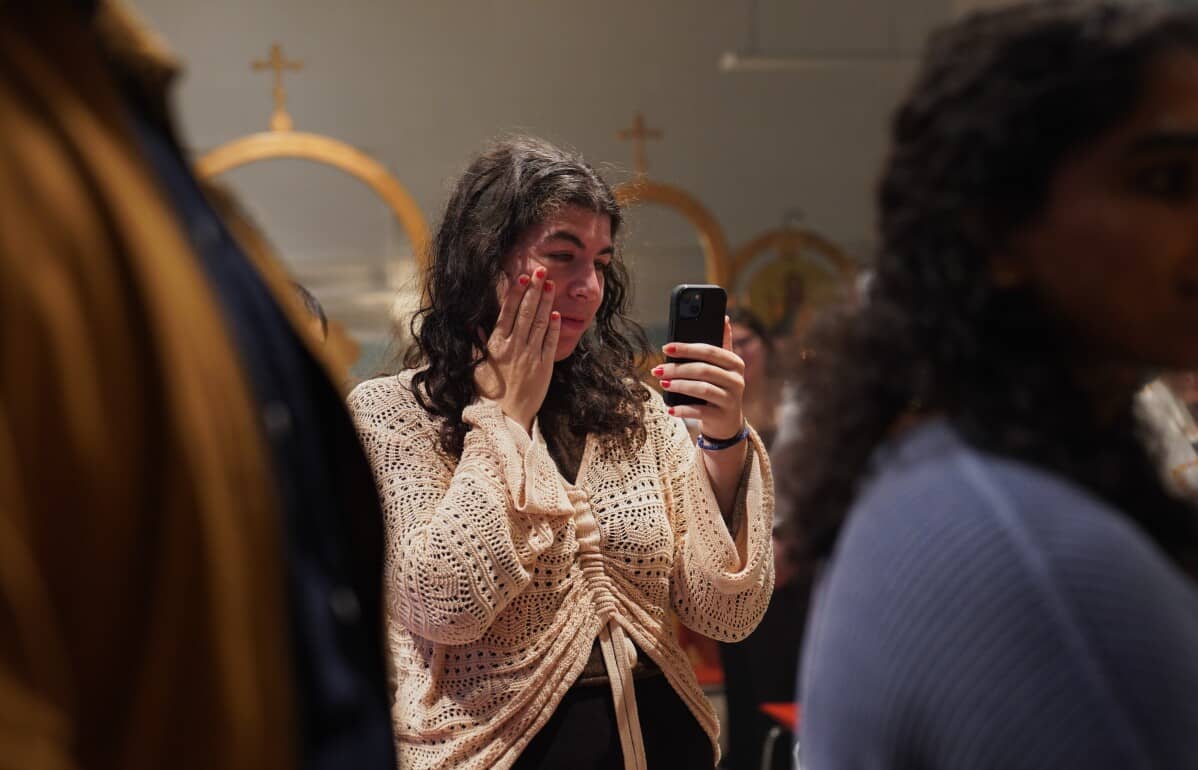She’s warm and affable, and speaks in slow, soft, measured tones. But when you listen to her describe the battle to provide pastoral care to immigrant detainees inside the McHenry County Jail, you know Sister JoAnn Persch is one nun you don’t want to mess with.
Sweet as an angel but tough as nails.
When local county, jail and immigration officials in 2007 told Sisters Persch and Pat Murphy they weren’t allowed access to the jail to provide pastoral care to the immigrant population, the nuns became the face of Illinois’ Access to Religious Ministry legislation. The law allowed them inside the jail, and what Sister Persch described as access to detainees not granted at other detention centers in the country.
“Pat and I have a motto that we do all of this peacefully, respectfully, but we never take no for an answer. That’s how we got where we are,” Persch said.
“We never take no for an answer because these men and women deserve this, and if we don’t speak up for them, who’s going to do it?”
McHenry County has a 10-year-old contract with Immigration and Customs Enforcement to house up to 400 immigrants who are awaiting deportation proceedings. Some of those detained are allowed to stay in the county for any number of reasons. The immigration defenses are too many to list here.
Those who are not so fortunate are sent back to their native country but first processed through the Chicago-area Broadview Detention Center. It’s the last stop before deportation.
The Sisters’ Interfaith Committee for Detained Immigrants prays weekly outside the Broadview Center. What Sister Persch sees there still sends shocks to her system. Men and women shackled at the hands and feet, packed onto vans to be sent off. Tearful goodbyes with loved ones who remain in the country. Farewells that are never long enough.
“Every time I come out ready to cry,” she said. “I just can’t believe that’s how we’re sending people out of this country. . You tell us they’re civil detainees, they’re not criminals, then why are you sending them off in shackles? That always bothers me.”
But at the McHenry County Jail, it’s a little different, Persch said.
“They’re hopeful,” she said. “Some know they might be deported but some have court dates hoping maybe they’ll get to stay. At Broadview, that’s it. They’re done.”
As part of the county’s pastoral care program, volunteers – there are about a dozen on average each week – come every Tuesday, outfitted with religious reading materials to provide to the detainees, an allowance unique to McHenry County, Persch said. They visit with them, pray with and for them. The volunteers take home stacks of prayer requests. They call a detainee’s family members with updates on their loved one. They have testified at deportation hearings. If a detainee doesn’t have money, the committee will put $10 on their commissary.
The detained immigrants are often – though not always – housed separately from the county jail’s criminal population. But like criminal defendants awaiting trial, detainees here wear the same orange jumpsuits, they eat the same jail food and are allowed visits with family through a monitor. Depression is all too common.
But for many in this population, Persch said, their crime was not having the legal paperwork for a better life.
“They’re not definitely not hardened criminals,” she said. “The majority of them might have an infraction of the law, but a lot of them don’t. They were picked up some other way but they have no papers.”
Maralee Gordon, is the Rabbi at Crystal Lake-based McHenry County Jewish Congregation, and part of the Interfaith Committee for Detained Immigrants since the beginning. She talked with the Northwest Herald about national immigration issues – the political tug-of-war to pass meaningful reform, the images of protesters demonstrating at the border that’s flooded with immigrants – the vast majority children fleeing war torn areas of Central America.
Rabbi Gordon described a xenophobia she can’t wrap her head around.
“It’s very strange to me that, here we are in a country of immigrants, that we have this whole hue and cry from people that we should not welcome immigrants,” she said. “This country is built on the work of immigrants.
“Knowing that everybody in this country is an immigrant . it’s incumbent on us to recognize that part of ourselves and have compassion and care for the immigrant population.”
Both Gordon and Persch took their break time on a recent Tuesday to meet with the Northwest Herald in the jail lobby. A request to Immigration and Customs Enforcement to observe the weekly meetings inside the jail was denied on the grounds that ICE didn’t have enough staff to accommodate such a request.
Such denials are not foreign to Sister Persch. Back in 2008, she and Sister Murphy were denied entry into both the Broadview Center and McHenry County Jail. But political pressure and a new law on the books eventually forced their hands. And so the pastoral care program was born.
“All of this was always very pleasant, but pleasantly saying no,” Persch said.
David Warren of Crystal Lake also was key to the Interfaith Committee from the get-go. He and a handful of others first met twice monthly with the jail’s Chinese population.
“They took my little lemonade stand and turned it into a Fortune 500 company,” said Warren, who belongs to the Order of Secular Franciscans with the Catholic Church.
When describing the ministry and those it serves, Persch likes to tell the story of “the old rabbi.” The rabbi asks God, ‘When does night becomes day?’
To which God responded, Persch said, ‘When you can look in the eyes of every man and woman and see them as your sister or brother. Until then, it is night.’
“We are living in darkness, when we can’t see these people as human beings in need of our love and support.”
___
Source: The (Crystal Lake) Northwest Herald, http://bit.ly/1l9sZQ3
___
Information from: The Northwest Herald, http://www.nwherald.com
















